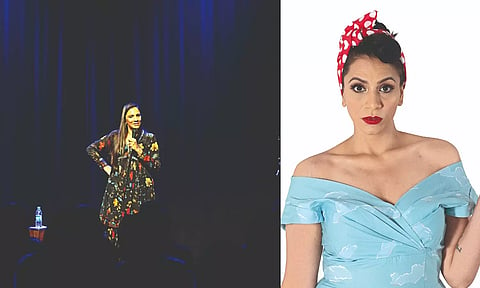

CHENNAI: Relishing on the south Indian delicacies from a restaurant in T-Nagar, stand-up comedian Sharul Channa discovers the love people here have for their rice. Amused by the city’s energy even after a heavy lunch, she urges on siesta to be a Chennai thing.
Born in Indore, Sharul’s family moved to Singapore when she was three months old. Talking about the present state of stand-up comedy as a profession for women, she also highlights the diverse aspects of stand-up in different countries.
When and what made you explore the profession of stand-up comedy?
About 13 years ago, when the new wave of stand-up comedy was just blooming, I was encouraged by a club owner to jump on at an open-mic as no Singaporean women had attempted stand-up. I did my slot of five minutes, and there, I got hooked to the genre.
What aspects do you focus on through your stand-up shows?
I talk about international news, my upbringing, my views on marriages and having children, society’s way of thinking and sometimes just good old mother-in-law humour.
How different is it for the public at large to accept a woman in the profession of stand-up? How has the journey been for you?
Initially, it was a difficult journey. Women aren’t encouraged to be funny. We are expected to be coy, shy, sheepish and obedient. So when they see a woman with an opinion talking into a mic, they don’t know what to expect. It took me some time to be accepted by audiences, but once they accepted me as their ‘female voice’ who made them laugh, then it was slightly easier.
Since you are settled in Singapore, can you elucidate on the way a stand-up piece which you prepare differs from country to country?
If you travel enough, you will start writing international humour which can mostly work in any part of the world. In India, I am a Singaporean Indian woman comedian. So I can talk about Singapore, India, being a woman, and my perspective about life quite effortlessly. Singapore has a very diverse crowd. So we are forced to entertain everyone in the audience and unite them in laughter.
Can you share some of the observations you made of the city from your visit?
I realised there are many women police officers in the city. I felt so proud to see women traffic police officers screaming across at men to go right, left and straight. I always knew women were better at giving directions.
I think it was a rude shock that Chennai folks are so polite. Especially because I just came from Delhi where there are highly-charged Punjabis on the road.
I also noticed how I was being referred to as ‘sir’ a lot instead of madam, which I think is a cultural thing.
The vegetarian thalis here are fulfilling. One of the days after lunch, I visited the Vivekanandar Illam to find some peace. But I realised I had already attained enlightenment with the thali.
What was the creative process that went behind for the content for the show in Chennai? How is it different from your other set of stand-ups which you have previously presented in India?
The show is written to be more international. Hence, it’s about my upbringing, my migrant parents, being a middle-child, being a woman in a society that keeps forcing me to have children, being a dog mother instead of giving birth, and also the things that don’t make sense or are different from back home. In terms of south-Indian context, I reached the city early to study the folks, having lengthy conversations with cab drivers and digging deep into the true essence of Chennaiites.
Do you think language plays a huge role in the kind of stand-up people from a particular place accept? Since your pieces are going to be in English for the audiences in Chennai, do you think it will create less impact on the audience here who would rather prefer their native language?
I think our mother-tongue definitely hits us in a different way. Performing stand-up in Tamil or Hindi requires one to understand the rhythm of the language first. If you think in your mother tongue, but perform your stand-up in English, it can have a similar impact on the audience.
I usually think in Hindi and perform in English. That’s because I grew up speaking Hindi at home, as my mother is a Hindi teacher. But I definitely like to add a bit of local words of the town or country I am performing in to make it more relatable.